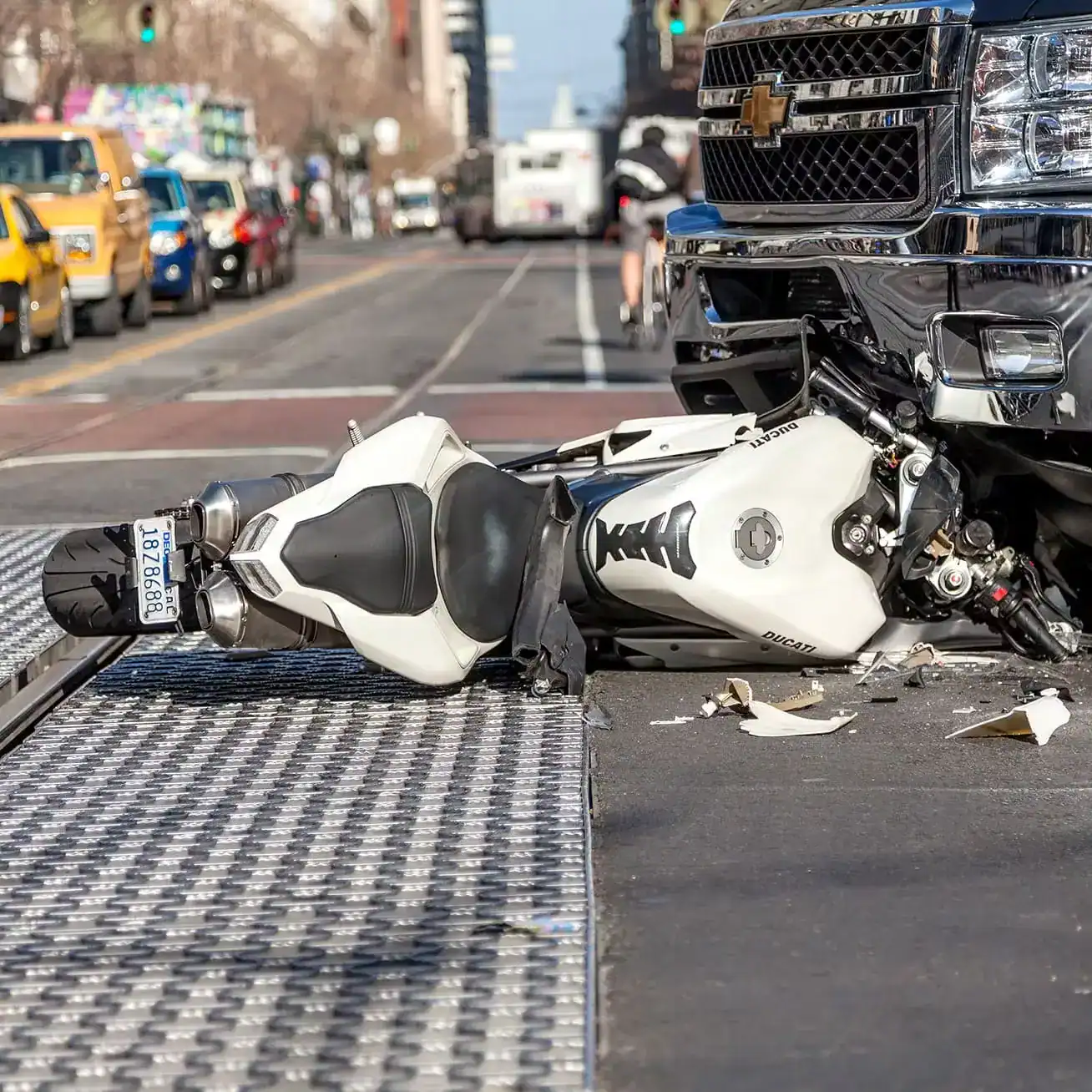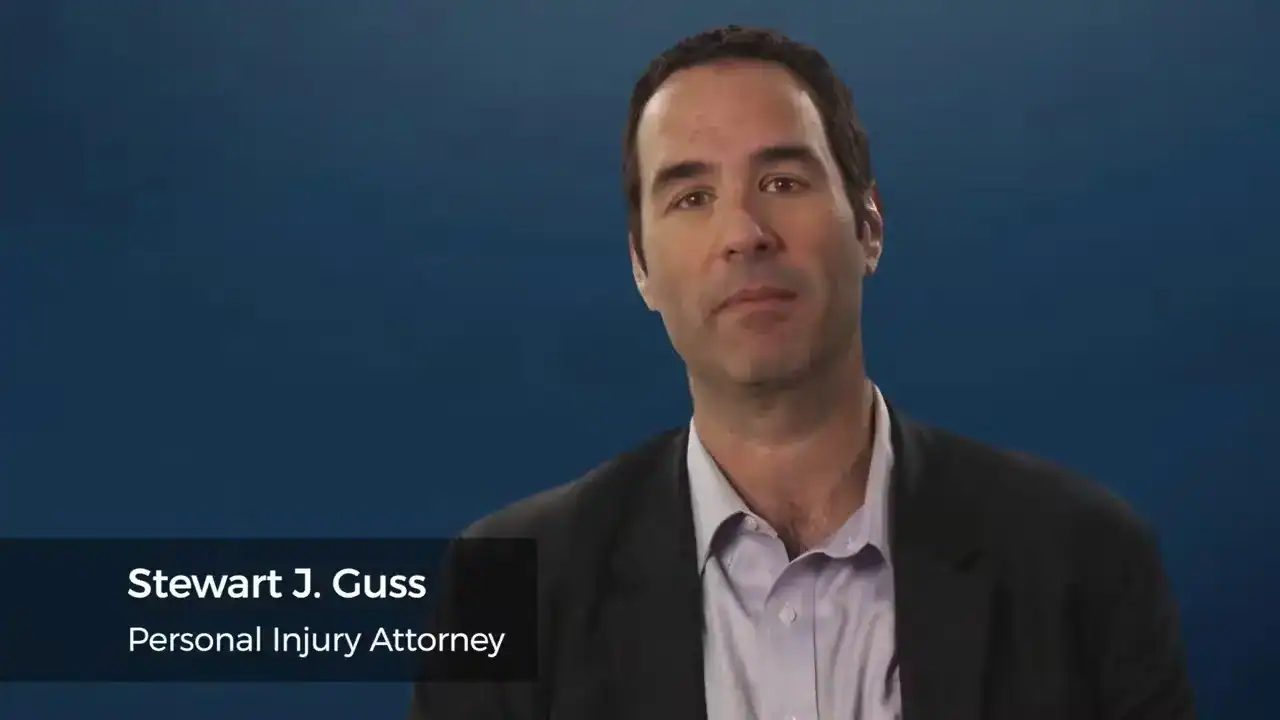
We Win or You
Pay Nothing
We have staff standing by at all hours to help you.
Immediate
Medical Care
Receive the treatment you need, as soon as you need it, with usually no out-of-pocket cost to you.
24/7
Access to Us
Speak with a real human being, no matter what time it is.
Client
Satisfaction
Enjoy working alongside a firm with a sterling reputation for 1,400+ 5-Star Google Reviews.
Fighting for the rights of injured victims
While riding a motorcycle is an excellent way to see more of the American landscape, riders can be more vulnerable to accidents, as their protective gear and visibility are limited.
If you have suffered injuries after a motorcycle crash due to another driver’s negligence or recklessness on the road, you may be entitled to significant compensation. Our trusted motorcycle accident lawyers in Katy, have over 25 years of experience in handling cases just like yours. We will fight relentlessly for your rights and communicate with insurance companies and third parties on your behalf so you can focus exclusively on the healing process after a devastating injury.

Why Is It So Important To Work With A Motorcycle Accident Lawyer After A Crash?
After a motorcycle accident, victims may need extensive medical care for their injuries, and many have a lengthy road of recovery ahead of them. While you focus on self-care, your personal injury attorney can gather critical evidence for your case, building a strong claim that enables you to recover the maximum in damages that you are entitled to. This money can be used to support your family, pay medical bills, and cover lost wages while you are incapacitated. Our motorcycle accident lawyers in Katy at Trust Guss are aware of the tactics insurance companies use to try to limit liability, and we know how to negotiate on your behalf.
What Are Some Common Causes Of
Motorcycle Accidents In Katy, TX?
It can be complicated to figure out what caused a motorcycle accident, as multiple parties may be involved, and road damage or poor signage may also play a role. In general, the following may be responsible for your collision:
- Speeding
- Distracted driving
- Texting while driving
- Drunk driving
- Swerving in and out of lanes
- Abrupt lane changes or highway departures
- Abrupt braking
- Tailgating
- Lane splitting
- Poor motorcycle maintenance
- Dangerous weather conditions
- Forgetting to use headlights
- Manufacturer defects
- Driving without proper training or licensure
- Failing to use safety precautions, such as wearing a helmet and a face shield
Motorcycle collisions can be potentially life-altering in terms of injuries sustained. The National Highway Traffic Safety Administration reports that motorcyclists are 35 times more likely to suffer fatalities in an accident than those in passenger vehicles.
What Compensation Can I Receive After A Motorcycle Accident
There is a wide range of damages you can receive after a motorcycle accident in Katy, and our esteemed motorcycle accident attorneys in Katy at Trust Guss will do everything possible to maximize your compensation. If another party caused your injuries through recklessness or negligence, you may be entitled to the following:
- Medical expenses, both present and future – These include hospitalizations, surgeries, medications, doctor’s visits, physical therapy, walking aids, home retrofitting, and more.
- Lost wages and lost future income – If you are unable to work, these damages can cover your losses, including missed career opportunities in the future.
- Pain and suffering – These damages compensate you for considerable physical and emotional pain experienced as a result of your accident.
- Wrongful death – If you lost a loved one or family member, you are entitled to compensation that covers funeral costs, burial expenses, and more.

What Kind Of Injuries Can Occur
After A Katy Motorcycle Accident?
Injuries after a motorcycle crash can be especially severe due to the rider’s lack of protection, visibility, and stability on the road. They may include the following:
- Traumatic brain injuries
- Concussions
- Spinal cord injuries
- Burns
- Broken bones
- Fractures
- Sprains
- Road rash
- Biker’s arm
- Nerve damage
- Amputations
- Internal organ damage
How Long Do I Have To File My Claim
After A Katy Motorcycle Accident?
In Texas, you will usually have two years from the date of your accident to file a claim. If you fail to do so within this period, you may lose the chance to recover the damages you need and deserve. It is easy to let two years slip by, especially when you’re focused on doing physical therapy, going to doctor’s appointments, and trying to rebuild your life.
Don’t wait. Contact our knowledgeable personal injury and motorcycle accident attorneys in Katy immediately, as this will give you the best chance at obtaining the compensation you are rightfully owed. Another reason to contact our Katy, TX, law firm right away is that after an accident scene is cleared, it gets harder and harder to gather key pieces of evidence. Eyewitness memories may fade, and security camera footage may be erased. Once you reach out to us, we can start working on your case immediately, optimizing your outlook for success.
Katy Motorcycle Accident FAQ
According to statistics provided by the Texas Department of Transportation, Texas motorcyclists suffered 1,810 suspected serious injuries and 2,726 non-incapacitating injuries in the span of only one recent year. Tragically, 410 people died as a result of motorcycle accidents in the state. If you or a loved one has experienced a motorcycle accident in Katy or the surrounding area, this guide provides answers to frequently asked questions (FAQs) we hear from our clients.
Texas is a fault state for vehicle accidents. Simply put, that means that whoever caused the accident is responsible for certain bills and other losses that a victim suffers. The driver who caused the accident likely breached the duty of care expected of Texas drivers—to drive safely, follow the law, and avoid preventable motorcycle crashes. Such a breach constitutes negligence, and negligent parties bear financial responsibility under Texas law for the damage that their actions directly cause. While breaking the law can determine negligence, any careless action resulting in an accident can make someone liable. Additionally, if bad mechanical work or a manufacturer’s faulty auto parts contributed to an accident, those parties can also be held liable for your injuries under Texas law.
If you already approached the at-fault party’s insurance company but they rejected your claim or are taking too long to provide payment to you, it’s wise to contact an attorney for help. Unfortunately, insurance companies don’t always play fair. They want to avoid approving claims so they can avoid paying victims. Make no mistake: these companies are in the business of making money. An insurance adjuster will arrive to evaluate your damages but may not come up with a number that adequately compensates you for your losses. They may deny your claim by arguing that you’re responsible for the accident, even if you aren’t. Insurance companies often make these claims a long, tedious, drawn-out process on purpose to discourage you from pursuing the money you deserve. Your calls may go unanswered, or the company may ask for more information after it’s had the claim for months already. Why? Because these companies use ‘deferring’ as a strategy to make you go away and give up. Insurance companies also use a strategy called ‘lowballing,’ which involves settling fairly promptly – but for a monetary amount far less than the true value of your claim. Don’t fall prey to this. If you have a lawyer on your side, the story changes. Lawyers can skillfully negotiate. They can counter all the misinformation, delay tactics, and tricks that insurance companies use. An experienced Houston motorcycle accident attorney can get insurance companies to release the check or offer additional compensation.
If you’re thrown from your motorcycle or otherwise severely injured, you may have no memory of the accident—just of waking up in an emergency room or hospital. If obtaining compensation for damages requires knowing who was at fault, what can you do? Texas law requires reporting of accidents resulting in injury, death, or property damage sufficient that the vehicle isn’t safe to drive. A crash report provides law enforcement’s assessment of what occurred, the circumstances, and who seems liable for the accident. The crash report should contain information about the other driver and any eyewitnesses, and the emergency department or hospital you arrived at should have some information about what occurred. In fact, your wounds or other damage can serve forensically to identify what happened. If all this fails or is insufficient (or if you have additional questions), our Texas motorcycle accident lawyers often work with professional investigative teams. Investigative teams can examine the scene (skid marks, impact traces, etc.), search for surveillance footage, and outsource experts to help them determine the causes of an accident.
Motorcycle accident victims often feel pain, trauma, and even amnesia in the aftermath of a crash. Therefore, it’s a good idea to know the protocol for what to do if you’re injured in a motorcycle accident in Katy. Move to a safe area if you are able. Don’t run the risk of another vehicle hitting you if you’re in traffic. Call 911. If emergency responders recommend that you take an ambulance to a hospital, go with them without question. If emergency responders feel that your injuries don’t require emergency department treatment, stay on the scene until law enforcement arrives. When law enforcement talks to you about the accident, if you notice anything relevant about the accident (such as evidence that the other driver was drinking or texting while driving), tell the officer. Stick to the facts, however, and don’t provide opinions, apologize, or inadvertently admit responsibility for the crash. Get a copy of the crash report if available, or find out how to obtain one later. You can usually get one by mail, online, or in person at the police station. Exchange information with all drivers (like e-mail, phone numbers, and insurance information). Take pictures of the scene and all vehicles. If you have a smartphone, use it. Get the contact information of any eyewitnesses. Go to a doctor as soon as you can (if you don’t receive emergency treatment immediately after the accident). Never neglect this step. Only a doctor can thoroughly examine and diagnose injuries following a motorcycle accident. Deadly serious injuries, such as traumatic brain injuries and cracked ribs, may not show immediate signs. Follow any treatment recommendations and keep all records of your treatment. Call a Texas motorcycle accident attorney to discuss how you can obtain compensation.
When a motorcycle collision injures you in Texas, you may be able to get money from the liable party. You may have the right to seek damage compensation in the following categories: Medical bills, including the cost of doctor’s office visits, emergency transport, emergency room treatment, surgery, hospitalization, rehabilitative therapy, prescriptions, retrofitting your home to accommodate your injury, assistive devices, and more. Lost income from work, if the accident or treatment caused you to need time off from work, you can be compensated for your lost wages. Pain and suffering; your stress, trauma, and emotional pain and suffering are just as valid as your physical injuries after a motorcycle wreck. You can pursue this compensation in two ways: You can approach the at-fault party’s insurance company, or you can bring a lawsuit in civil court with the help of a Texas motorcycle accident lawyer.
First off, the initial meeting to discuss your accident is always free with us. A lawyer needs to know what occurred and what injuries you sustained before they can tell you if you have a case. Second, our motorcycle accident attorneys work on a contingency fee basis. Their payment doesn’t come from your checkbook or wallet but from a percentage of the settlement you receive instead. Never let financial anxiety prevent you from teaming up with an attorney and pursuing justice. We believe everyone deserves access to the legal help they need, and we’ve made it our mission to provide it.
If your loved one died in a Katy motorcycle accident, your grief and loss may seem overwhelming. You shouldn’t have to struggle financially while in mourning. Fortunately, Texas law recognizes that there are financial, as well as emotional, ramifications of losing a loved one. The law allows certain family members to bring a wrongful death lawsuit if a motorcycle accident occurs, for which the decedent could have filed a Katy motorcycle accident claim had they lived. Eligible family members are: Surviving spouses, Children (including adopted children and adult children), Parents (including adoptive parents). If none of these folks take steps to file a wrongful death lawsuit, then the executor or personal representative of the decedent’s estate may file the claim. Wrongful death suit filings often seek damages in the following categories: Funeral and burial costs, Emotional and mental pain, suffering, and anguish, Lost love and companionship, Lost services, care, maintenance, support, and counsel formerly supplied by the decedent, Lost income and financial support formerly supplied by the decedent, Lost inheritance value if a longer life would have resulted in a larger estate.

Why Choose Trust Guss?

At Trust Guss, our clients are our number one priority, and we do everything possible to make them feel heard, valued, and defended. When you contact us, whether it’s at 8 am or the middle of the night, you will always speak to a live agent who is ready and willing to help you. For over 25 years, our team of personal injury attorneys has been tirelessly advocating for our clients, providing them with a source of steadfast strength during their most challenging legal ordeals. We work on a contingency fee basis, meaning that you will never pay any upfront costs. Once we win your case and recover your compensation, we will then take a percentage of those funds as payment. These are just a few of the many reasons why clients in and beyond Katy, TX, have given our firm over 1400 five-star Google reviews. Contact us today!
Stewart J. Guss established his law firm in 1999 and since then, has stayed true to his initial goal of providing a “Clients First” approach, concierge care, and sophisticated legal strategies that win cases. Over the years, Trust Guss has grown significantly and today employs over 100 legal professionals across four states, enjoying a broad national reach. Stewart grew up in Texas and received his Juris Doctor Degree from the University of Houston Law Center. He is an active member of the Texas Trial Lawyers Association and has received effusive recognition across the country for his exceptional skill and insistence on excellence. Stewart was named in the top 1% of America’s personal injury lawyers by the National Association of Distinguished Counsel and, over the years, has been lauded as a “Top Lawyer” by the National Trial Lawyers, Rue Ratings, and Houstonia Magazine. Despite his demanding work schedule, Stewart is devoted to philanthropy and has funded several notable university scholarships while also contributing to charities across the U.S.
Katy Office
6701 Hwy Blvd Suite 205, Katy, TX 77494Get a Free Consultation
 2 minute response
2 minute response 24 hours a day, 7 Days a Week
24 hours a day, 7 Days a Week Dedicated Trust Guss Intake Team
Dedicated Trust Guss Intake Team
"*" indicates required fields

